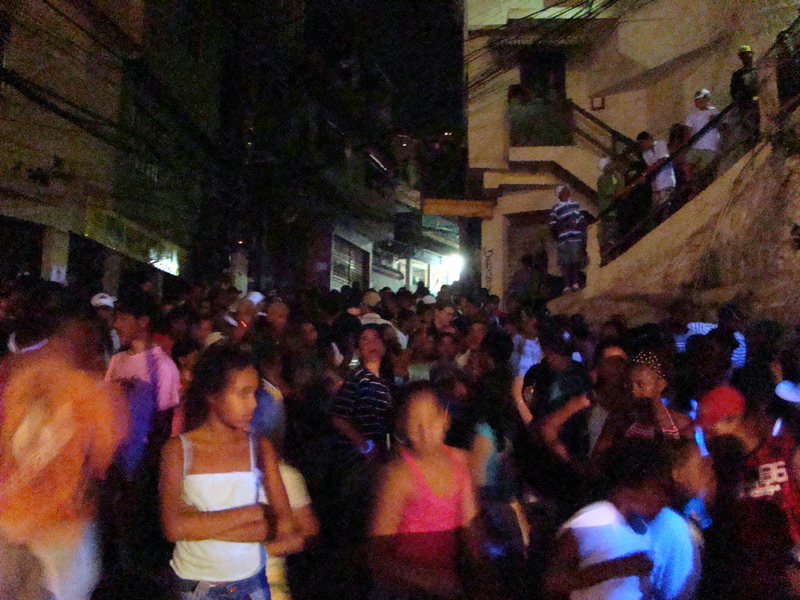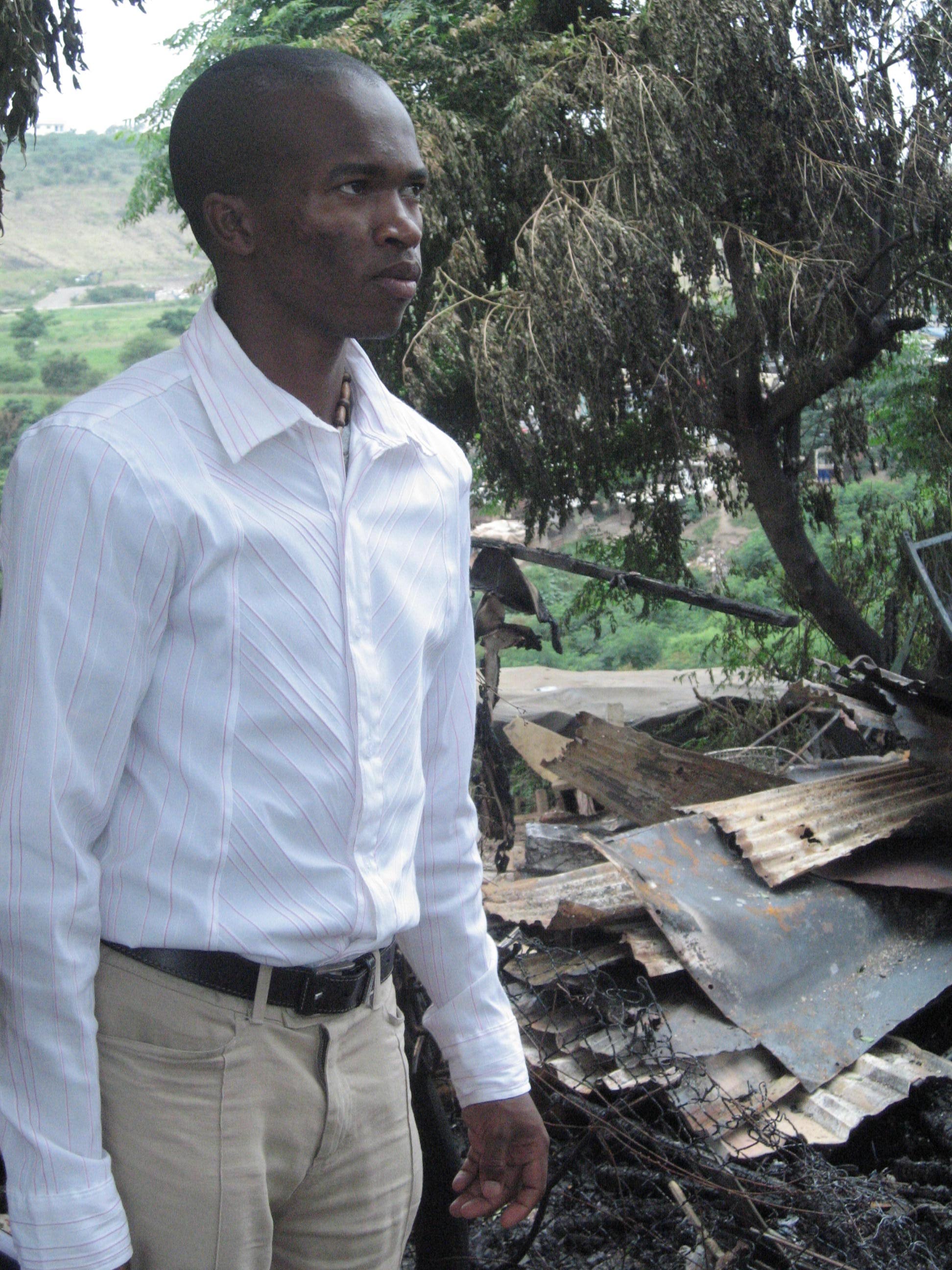An eloquent message from S'bu Zikode, of the Abahlali baseMjondolo Movement in South Africa:
Silencing the Right to speak, is Taking away CitizenshipSunday 30 September 2007Not only as a leader of the Movement of Abahlali, but also as an ordinary South African Citizen, as a parent, as a father and mostly a human being I am extremely hurt. My heart is torn apart when in my own country, in a broad daylight like on Friday the 28 September 2007 it is made so clear that the poor are not Citizens. When they try to sweep up us out of the cities it is clear that we are not citizens. When they beat us to stop us speaking it is clear that we are not citizens.
It is of a great concern that thousands of Abahlali baseMjondolo members have marched peacefully to the eThekwini municipal mayor Obed Mlaba and have been received with such violence. We marched to demand no power, no position no fame, nothing from his family. We only marched for the Right to life of the shack dwellers, the farm dwellers and thousands of forgotten citizens of this country in the name of democracy, in the name of a better life for all.
What a life without shame, without conscience, without respect for vulnerable groups in our society the elderly women and children. The presence of church leaders amongst the poor has had a far-reaching reason to those in need of a church. The biggest curse is that while praying, the innocents were started to be flooded with heavy forces of water, the strong church leaders stood very firm to shield the innocents. The heavy armed members of the SAPS started assaulting the church leaders, throwing teargas, beating helpless women, shooting old women and men at the back while running to their homes.
This event took place at about 12:15pm when the innocent marchers were still waiting for the mayor to receive the memorandum of demands as arranged with him. The march had complied with the Gathering Act of SA. Without any provocation or unruliness the police decided to act on the instructions of the Mayor of non compliance with the South African Law, because he thinks being at that position means being the law unto himself.
The incident took place in my presence. I had offered myself to represent the helpless so that they may see many more, so that they may not be alone while taking their pain for as long as they still believe that we all have all the Right to life. I think this is a difficult leadership style one needs to adopt to save so many lives. Thus I think it is enough that many of us are born and die in shack fires in jondolos, that we die through various diseases associated with unhygienic conditions from the poisonous air we breath in the jondolos, that we live and die with TB and HIV/AIDS as the research confirms that the shack settlements have the highest infection of the virus. People die because of crime, floods and storms; they die while trying to find toilets in the night. We are seeing no future to our children except to the children of those in authority like Mayor Mlaba. Some of us die while trying to speak truth to power, as we get shot while marching.
After a long shooting I had received a call from the Municipality saying that a representative is on his way to receive the memorandum. But already fourteen members were arrested, four were heavily shot and two were badly wounded. This was quite disturbing. Who was going to hand over the memorandum as the police under the command Sydenham Glen Nayager had already chased everyone? In the next ten minutes I received a call saying that I must bring the Memorandum in Baig's office as the official was very scared to come out. Then I said he must come out as most comrades have fled, wounded and harmless, and most police were gone still chasing people away down the roads. I had remained with a small group of less than one hundred with elderly people and pregnant women you couldn't flee.
Then we had no other choice but to face the remaining police and I read the memorandum loudly to Mr. Mzi Magubane who described himself as a senior Manager from the Dept. of Housing in eThekwini municipality. Magubane has been described by System Cele as another old liar. She said that when she was still a child 'this man used to deceive my father when he was still alive working in the Kennedy Road Committee, today he has come to bluff me.' So Bahlali your message was sent with another dishonest man with a history of lies.
Today we have to take care of our comrades who for no reasons were imprisoned; today we have to look for money to pay bail and lawyers to represent them in court for nothing. Today like other days we have to run around doctors and hospitals to try and support the shot and hurt comrades. Today like any other day we have stood together and planned an alternative, as we shall not allow any forces to force us silent. So as long as Amandla belongs to us we shall not fear. As long as democracy is used to further the political scores of the minority and as long as there is great inequality in our society Abahlali will stand together for the dawn of true democracy where everyone matters.
As challenges increase every day for the Movement one is for us to seek for justice to take its course. I will soon be writing to the Amnesty International for a wide range of legal support on this dirty behavior of SAPS. But all of this will not compromise any demands. We will make a follow up and engage the city in a progressive manner that seeks to see a remarkable social change for all. Our city and our country still need true leaders that do not run away from their responsibility like Mlaba. We need leaders that will act, as servants of the public not expect to be masters over the public like eThekwini mayor Obed Mlaba.
S'bu Zikode
Abahlali baseMjondolo Movement SA.

 If Kenya's incumbent president, Mwai Kibaki, did not rig the election, asks challenger Raila Odinga, "why does he seclude himself in State House at dusk to be sworn in without the media, diplomats, observers and other Heads of States." For those who don't know the details, Odinga was leading in the polls in the lead up to the election, and was ahead by 1 million in the count just one day before the official results were announced. Once the election commission announced th results, the incumbent president was sworn in for a second term in a secretive 15-minute action and the government immediately imposed controls on the press.
If Kenya's incumbent president, Mwai Kibaki, did not rig the election, asks challenger Raila Odinga, "why does he seclude himself in State House at dusk to be sworn in without the media, diplomats, observers and other Heads of States." For those who don't know the details, Odinga was leading in the polls in the lead up to the election, and was ahead by 1 million in the count just one day before the official results were announced. Once the election commission announced th results, the incumbent president was sworn in for a second term in a secretive 15-minute action and the government immediately imposed controls on the press.

















